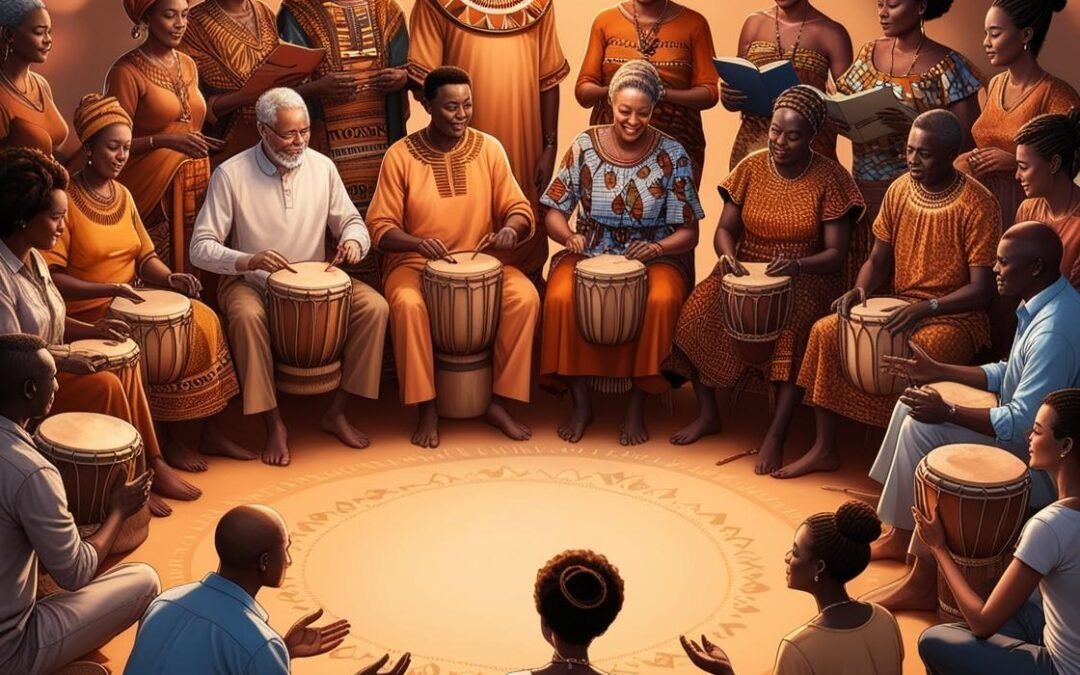Destigmatizing Mental Health in African Cultures: Exploring Kusintha, Ukuqaphela, and Mindfulness
Mental health stigma remains a significant barrier in African communities, often rooted in cultural beliefs that associate mental illness with spiritual causes like witchcraft or ancestral displeasure. To address this, culturally relevant practices like Kusintha (a Bantu term for contemplation) and Ukuqaphela (a Zulu term for awareness or mindfulness) can be leveraged alongside global mindfulness practices. This blog explores how these practices can bridge traditional African perspectives and modern mental health approaches to destigmatize mental illness, drawing on cultural insights and recent studies.
Understanding Mental Health Stigma in African Cultures
In many African societies, mental health conditions are misunderstood, often attributed to supernatural forces. A 2024 study in South Africa’s Harry Gwala District found that traditional health practitioners viewed mental illness as caused by witchcraft or ancestral callings, diagnosed through spiritual interventions like divination. Research among the Maasai in Tanzania revealed beliefs that mental disorders stem from curses, with prevention tied to traditions rather than modern treatments. In Nigeria, rural women associated mental illness with spiritual causes, leading to stigmatization where affected individuals are ostracized.
This stigma discourages help-seeking, delays treatment, and isolates those affected. A 2023 review highlighted that stigma in psychiatric care across cultures, including African ones, increases morbidity and reduces quality of life. Destigmatization requires culturally sensitive approaches that resonate with local beliefs, making tools like Kusintha, Ukuqaphela, and mindfulness promising avenues.
Kusintha: A Bantu Contemplative Tradition
Kusintha, derived from Bantu languages, refers to a contemplative practice akin to introspection or deep reflection. While not widely documented, it aligns with African cultural practices emphasizing community, ancestral connection, and self-awareness. Unlike mindfulness, which often focuses on individual awareness, Kusintha may incorporate communal storytelling, proverbs, or rituals to process emotions and foster resilience.
For example, Somali therapist Ahmed Hassan uses proverbs like “One man fears fire; another man fears ashes” to teach concepts like rational versus irrational fear, helping refugee children process trauma. This embeds mental health discussions within cultural frameworks, reducing stigma by framing emotional struggles as universal. Similarly, practices like the Medicine Wheel among Indigenous groups, emphasizing interconnected relationships, share parallels with Kusintha’s holistic view.
Kusintha can be adapted by:
- Using Proverbs and Stories: Integrating traditional narratives to discuss mental health, as in Hassan’s work.
- Community Rituals: Encouraging group-based reflection to normalize emotional expression.
- Ancestral Connection: Framing mental health as honouring one’s lineage, aligning with ancestral beliefs.
Ukuqaphela: A Zulu Approach to Awareness
Ukuqaphela, a Zulu term, translates to “being aware” or “mindfulness” and reflects a culturally grounded practice of heightened awareness of self, community, and environment. Rooted in Zulu traditions, Ukuqaphela is often practiced through rituals, communal gatherings, or reflective moments during storytelling or drumming, fostering a sense of presence and interconnectedness. Unlike Western mindfulness, which may emphasize solitary meditation, Ukuqaphela is inherently communal, aligning with Zulu values of ubuntu (humanity toward others).
For instance, in Zulu culture, meditative practices often occur during ceremonies where drumming or chanting creates a focused, present state, as noted in discussions of Black African meditation practices. Ukuqaphela can be seen in the way elders guide communities to reflect on challenges collectively, promoting emotional resilience through shared wisdom.
Ukuqaphela can be adapted for mental health by:
- Communal Reflection: Using group storytelling or drumming sessions to foster awareness and emotional processing.
- Ubuntu Integration: Framing mental health as a collective responsibility, reducing individual stigma.
- Ritual-Based Practices: Incorporating traditional ceremonies to teach awareness techniques.
Mindfulness: A Global Practice with Cultural Adaptations
Mindfulness, rooted in Buddhist meditation, is defined as non-judgmental, moment-to-moment awareness. Since Jon Kabat-Zinn’s Mindfulness-Based Stress Reduction (MBSR) in the 1970s, it has been adopted in Western psychology to manage stress, depression, and anxiety. A 2019 meta-analysis showed mindfulness improves employee mental health, while a 2016 review confirmed its effectiveness in reducing mental health conditions.
However, mindfulness’s Buddhist origins and Western adaptations can feel foreign in African contexts. A 2017 study on mindfulness in minority communities noted that cultural mismatches—like unfamiliar metaphors—can alienate participants. In African settings, similar challenges arise when mindfulness is presented without context. A 2014 study found African Americans valued mindfulness when likened to prayer, offering “mental clarity” similar to meditation.
Adapting mindfulness involves:
- Cultural Metaphors: Using idioms like “clearing the mind as one sweeps a compound” to explain mindfulness.
- Group-Based Practices: Aligning with communal values by practicing mindfulness in groups.
- Spiritual Integration: Framing mindfulness as compatible with Christian, Islamic, or traditional African spiritual practices.
Kusintha, Ukuqaphela, and Mindfulness: Complementary Strengths
These practices share goals of fostering self-awareness and emotional regulation but differ in approach:
|
Aspect |
Kusintha |
Ukuqaphela |
Mindfulness |
|
Cultural Context |
Bantu, emphasizing community and ancestry. |
Zulu, rooted in ubuntu and communal rituals. |
Buddhist, often secularized in Western contexts. |
|
Focus |
Holistic reflection, often communal, via storytelling. |
Collective awareness through rituals and shared wisdom. |
Individual, present-moment awareness, often decontextualized. |
|
Delivery |
Proverbs, group discussions, spiritual practices. |
Drumming, storytelling, ceremonial reflection. |
Structured programs like MBSR or apps. |
|
Stigma Reduction |
Normalizes via cultural narratives. |
Reduces stigma through collective responsibility. |
Requires adaptation to avoid alienation. |
Studies suggest all three can be effective when tailored. A 2022 study in Uganda used community theatre to destigmatize mental illness, showing culturally adapted interventions reduce stigma. A 2018 paper on mindfulness emphasized integrating local spiritual traditions for acceptability.
Strategies for Destigmatization
To destigmatize mental health, a hybrid approach combining Kusintha, Ukuqaphela, and mindfulness can be implemented:
- Community-Led Workshops:
- Train local leaders, like Zulu elders or traditional practitioners, to teach Kusintha-inspired reflection and Ukuqaphela-based drumming alongside mindfulness exercises.
- Example: In Somalia, proverbs discuss trauma, which could be paired with Ukuqaphela’s communal reflection.
- Cultural Narratives in Media:
- Create radio dramas or social media campaigns blending Kusintha’s storytelling, Ukuqaphela’s communal wisdom, and mindfulness principles, portraying mental health as universal.
- Example: Use Zulu proverbs in media to teach emotional resilience, as in Hassan’s children’s books.
- Training Healthcare Providers:
- Equip health workers to integrate Kusintha, Ukuqaphela, and mindfulness into primary care, as in Uganda’s theatre intervention.
- Use culturally competent language, like Zulu idioms, to avoid Western-centric terms.
- Spiritual Integration:
- Collaborate with religious leaders to frame mental health as spiritual growth, aligning with findings that African Americans connect mindfulness to prayer.
- Example: Present Ukuqaphela as “listening to the ancestors” or achieving peace in prayer.
- Youth Engagement:
- Introduce Kusintha, Ukuqaphela, and mindfulness in schools through storytelling or drumming clubs, building on work with refugee children.
- Use peer-led models to normalize mental health discussions.
Challenges and Considerations
- Cultural Sensitivity: Interventions must avoid Western frameworks, as cautioned in a 2017 study. Community advisors should guide design.
- Access: Rural areas lack resources, necessitating mobile solutions, as in Uganda’s approach.
- Scepticism of Modern Methods: Spiritual beliefs may cause resistance, requiring gradual integration, as noted in Nigerian studies.
- Research Gaps: Limited studies on Kusintha and Ukuqaphela highlight the need for ethnographic research.
Conclusion
Destigmatizing mental health in African cultures requires honouring traditions while introducing effective tools. Kusintha and Ukuqaphela offer culturally resonant frameworks to normalize mental health through storytelling, communal reflection, and rituals rooted in Bantu and Zulu values. Mindfulness, when adapted to local idioms and spiritual practices, complements these by providing structured techniques. By combining these in community-led interventions, we can challenge stigma, foster acceptance, and promote mental well-being across African communities.
Collaborate with local organizations or consult resources like the Mind & Life Institute for culturally adapted strategies. Together, we can build a future where mental health is embraced as a universal aspect of human experience.

